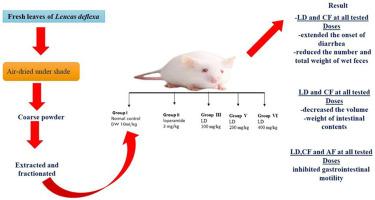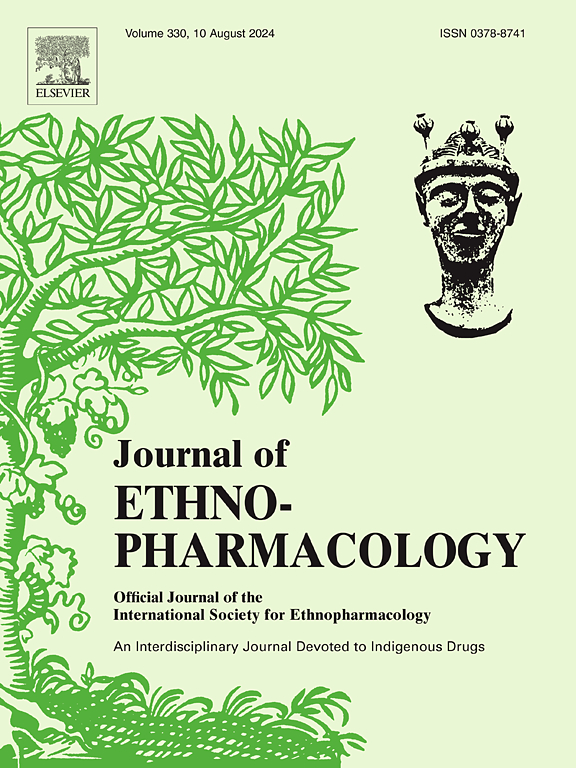对啮齿动物腹泻活性的水醇提取物和Leucas deflexa Hook.f(唇形科植物)叶片溶剂馏分的体内评估
IF 4.8
2区 医学
Q1 CHEMISTRY, MEDICINAL
引用次数: 0
摘要
民族药理学意义:抗生素耐药细菌的出现加剧了人们对新型止泻药的探索。植物提取物具有调节肠道蠕动和促进水分吸收的能力,因此是很有前景的替代品。Leucas deflexa Hook.f. 是一种原产于埃塞俄比亚的植物,其叶子历来被用于治疗腹泻疾病。然而,其传统应用还有待科学证实:材料与方法:将健康的瑞士白化小鼠随机分为五组,每组分别进行蓖麻油诱导腹泻、胃肠道蠕动和抗肠套叠实验。对照组服用蒸馏水(10 毫升/千克),阳性对照组服用洛哌丁胺(3 毫克/千克)。其余各组分别服用不同剂量(LD100、LD200 和 LD400 毫克/千克)的水醇提取物或其馏分(Leucas deflexa Hook.f.Result.):与阴性对照组相比,在所有给药剂量下,粗提取物和氯仿馏分都能显著(P < 0.001)延缓腹泻的发生、减少排便次数并降低粪便总重量。丁醇萃取物和水萃取物在剂量分别为 200 毫克/千克和 400 毫克/千克时具有显著的止泻效果。在不同剂量下,包括粗提取物、氯仿、丁醇和水馏分在内的所有处理都能显著减少肠内容物的体积和重量(P < 0.001)。此外,与阴性对照组相比,剂量为 100、200 和 400 毫克/千克的氯仿、水馏分和粗萃取物大大抑制了胃肠道蠕动:本研究的结果证实了白千层叶在治疗腹泻方面的传统用途。这些发现为进一步探索这种植物提取物的基本机制和潜在治疗应用提供了科学依据。本文章由计算机程序翻译,如有差异,请以英文原文为准。

In vivo evaluation of anti-diarrheal activity of hydroalcoholic extract and solvent fractions of the leaf of Leucas deflexa Hook.f (Lamiaceae) in rodents
Ethnopharmacological relevance
The emergence of antibiotic-resistant bacteria has intensified the search for novel antidiarrheal drug. Plant-derived extracts offer promising alternatives due to their ability to modulate gut motility and enhance water absorption. The leaves of Leucas deflexa Hook.f., a plant native to Ethiopia, have been traditionally utilized in the treatment of diarrheal diseases. Nonetheless, its traditional application has yet to be scientifically confirmed.
Aim of the study
Hence, the aim of the present study was to evaluate antidiarrheal activity of the crude extract and fractions of the leaf of Leucas deflexa Hook.f (Lamiaceae).
Materials and methods
Healthy Swiss albino mice were randomly divided into five groups per experimental model: castor oil-induced diarrhea, gastrointestinal motility, and anti-enteropooling assays. The control group received distilled water (10 ml/kg), while the positive control was treated with loperamide (3 mg/kg). The remaining groups were administered various dosages (LD100, LD200, and LD400 mg/kg) of a hydroalcoholic extract or its fractions from Leucas deflexa Hook.f.
Result
The crude extract and chloroform fraction substantially (P < 0.001) delayed the onset of diarrhea, reduced fecal frequency, and decreased total fecal weight at all administered doses compared to the negative control. The butanol and aqueous fractions exhibited a substantial antidiarrheal effect at doses of 200 mg/kg and 400 mg/kg, respectively. All treatments, including the crude extract, chloroform, butanol, and aqueous fractions, substantially (P < 0.001) reduced the volume and weight of intestinal contents at various doses. Additionally, the chloroform, aqueous fraction, and crude extract at doses of 100, 200, and 400 mg/kg substantially inhibited gastrointestinal motility compared to the negative control.
Conclusion
The results of this study corroborate the traditional use of Leucas deflexa leaves in the treatment of diarrhea. These findings give a scientific justification for further exploration of the underlying mechanisms and potential therapeutic applications of this plant extract.
求助全文
通过发布文献求助,成功后即可免费获取论文全文。
去求助
来源期刊

Journal of ethnopharmacology
医学-全科医学与补充医学
CiteScore
10.30
自引率
5.60%
发文量
967
审稿时长
77 days
期刊介绍:
The Journal of Ethnopharmacology is dedicated to the exchange of information and understandings about people''s use of plants, fungi, animals, microorganisms and minerals and their biological and pharmacological effects based on the principles established through international conventions. Early people confronted with illness and disease, discovered a wealth of useful therapeutic agents in the plant and animal kingdoms. The empirical knowledge of these medicinal substances and their toxic potential was passed on by oral tradition and sometimes recorded in herbals and other texts on materia medica. Many valuable drugs of today (e.g., atropine, ephedrine, tubocurarine, digoxin, reserpine) came into use through the study of indigenous remedies. Chemists continue to use plant-derived drugs (e.g., morphine, taxol, physostigmine, quinidine, emetine) as prototypes in their attempts to develop more effective and less toxic medicinals.
 求助内容:
求助内容: 应助结果提醒方式:
应助结果提醒方式:


